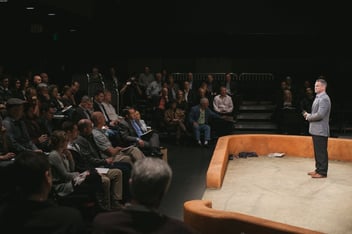For those of you following us on social media (insert shameless plug to follow Rewire on Facebook and Twitter here), we've shared this video with you before. It's a really fun video about a cool idea that could benefit a lot of people if replicated in other countries.
Today though, I want to do an exercise with you all that I used to do with my speech and rhetoric students whenever we'd watch presidential speeches or Super Bowl commercials. I want us to narrow our focus to a particular issue or set of ideas and then see what's happening in the moment related to these ideas within the video.
I want us to think about the concepts of fun and the Lizard Brain as we watch this video. Because what is displayed here plays a huge role in how we overcome Lizard Brain in order to make positive changes in our work. As you watch this video, think about what happens as the average person approaches the exit from the subway for the first time. They're confronted with a choice: "Staircase or escalator?" And in the blink of an eye, the mind makes a bunch of calculations about things like energy expenditure, time in transit, traffic flow and so on. Then, as the video shows, most people's Lizard Brain kicks in to convince them that the escalators are in the best interests of their survival. And from there, the habit-seeking part of the Lizard Brain kicks in to remind them to take the escalator each subsequent time they exit the tunnel in the future. They don't even see it as a choice really. It's crazy, but what you are seeing in this video is nothing less than Lizard Brain operating at the cultural level.
But how do you get change? What is a solution to effect decision-making in real time in order to make positive change? Well, in the video above, you take the giant floor keyboard from Big and put it on top of the stairs. In a word: enjoyment. Fun. The opportunity to find enjoyment in a necessary task (such as exiting the subway) is so strong that it can overcome the Lizard Brain to allow us to make positive changes.
So, think about the positive change you know would benefit your work; your company. Now think about the piano stairs and ask yourself a few questions about enjoyment:
- Is there some aspect of this activity/change that is actually fun?
- Is there a way that I could approach this to make it more enjoyable? Are there any tweaks I could make in order to make it more enjoyable (like putting keys on a stairway)?
- Can I make the activity itself fun or can I give myself and my team something enjoyable to do while we're engaged in the activity?
Questions like these are important because, if we can find some form of enjoyment as we're engaging in growth habits (whether that's taking the stairs, making more calls, having regular meetings, etc.), we are giving ourselves a huge strategic advantage in making them stick. If you're looking to make some difficult but positive changes, look for enjoyment along the path.
Where have you seen fun or enjoyment play a role in your work? Or have other thoughts on this dynamic of "enjoyment that facilitates change?" Drop me a line in the comments! Cheers to having fun and quieting the Lizard.




